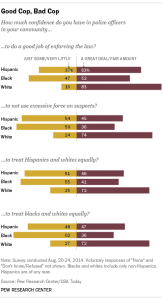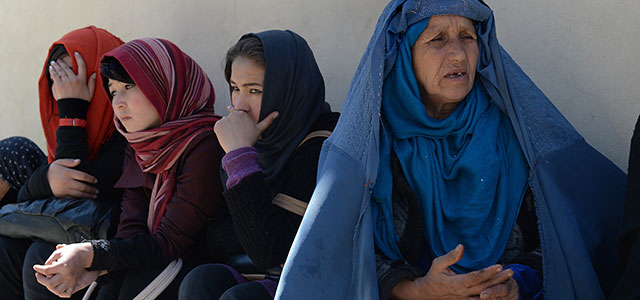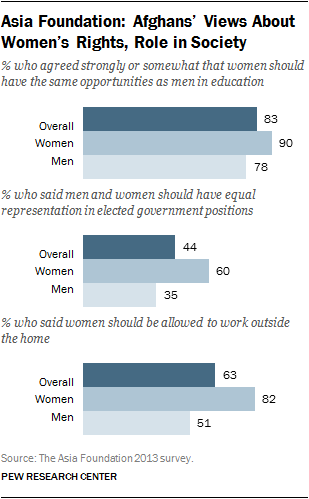

Credit: Shah Marai/AFP/Getty Images
The debate about women’s participation in Afghanistan’s political process has intensified ahead of this weekend’s elections, in part due to the unusually high level of women’s involvement in campaigns. A record number of women are running for provincial council seats, according to the New York Times, and Habiba Sarobi is the first female vice presidential candidate on a leading ticket.
Sarobi, however, has reportedly received numerous death threats, and despite some visible gains for women’s rights – especially since the days of Taliban rule from 1996-2001 – surveys show mixed feelings among the Afghan public about women’s role in society. For example, there is a stark contrast between the share of Afghan women (60%) and men (35%) who support equal representation for men and women in elected government positions, according to a 2013 survey of Afghans conducted by The Asia Foundation.

On one hand, 90% of Afghans in that survey agreed that everyone should have equal rights under the law (regardless of gender), and 83% agreed that women should have the same opportunities as men in education – including a strong majority (78%) of Afghan men. (The survey also found that 76% of Afghan women have received no education, an area Sarobi cites as a key priority.)
But at the same time, a significant minority of Afghans (36%) said that women should not be allowed to work outside the home – a share that had grown from 27% in 2006. While 82% of Afghan women said in 2013 that women should be allowed to work outside the home, just 51% of men agreed.
Among those registered to vote in Afghanistan, only 35% are women, the New York Times reports. And just 45% of Afghan men in The Asia Foundation survey said that women should decide themselves for whom to vote (compared with 62% of women). Nearly half (46%) of Afghans overall said that men should have some role in how women vote, either by advising them (25%) or by consulting with them before they decide (21%).
A Pew Research survey of Muslims in 39 countries conducted in 2011 in Afghanistan found that Afghan Muslims – nearly 100% of the population – are very conservative on women’s issues relative to Muslims in other nations.
In our survey, only 30% of Afghan Muslims (including 40% of women) said women should decide if they wear a veil, among the lowest levels of support for this in the countries surveyed. A similar share (30%) said sons and daughters should have equal inheritance rights, and nearly all Afghan Muslims (94%) said they completely or mostly agreed that a wife must always obey her husband.
